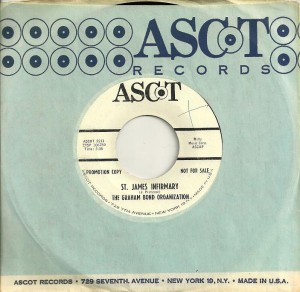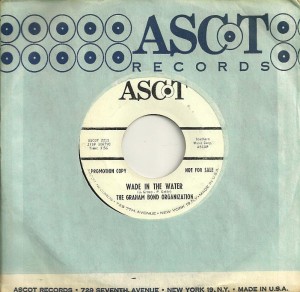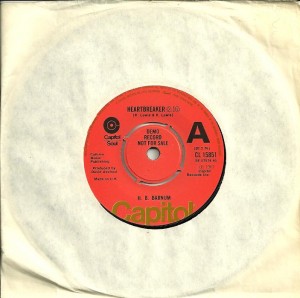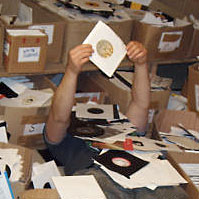Listen: St. James Infirmary / The Graham Bond Organization
St. James Infirmary / The Graham Bond Organization
Around ’65/’66, The Graham Bond Organization were a most evil sounding jazz/blues mixture, not only as a band, but compared to any other group during the period. Their two albums, including the Jack Bruce / Ginger Baker / Dick Heckstall-Smith lineup, were released by Columbia UK but remained unissued in the US. In fact the only American release ever from this line-up and The Graham Bond Organization in general was this lone 7″ on Ascot, both sides from that Columbia UK period. The much covered ‘St. James Infirmary’, a single only A side in the UK from early ’66, likewise took on the A side position in the US.
This American folk song of anonymous origin dates back to early 1900 and has taken on many interpretations, one of which claims the song to be written about St. James Hospital in London, which was used to treat leprosy.
Cab Calloway, Louis Armstrong, The Preservation Hall Jazz Band, Big Mama Thornton, Billie Holiday, Bobby Hackett, Stan Kenton, Lou Rawls, Bobby Blue Bland, Ramblin’ Jack Elliott, Doc Watson, Janis Joplin and The White Stripes are amongst those who have recorded the track. Yet it’s this one that competes neck in neck with the Cops ‘N Robbers version as my personal favorite.
The soon-to-be direction John Mayall’s Bluesbreakers with Dick Heckstall-Smith would assume on BAREWIRES can be heard here.
Listen: Wade In The Water / The Graham Bond Organization
Wade In The Water / The Graham Bond Organization
‘Wade In The Water’, the band’s first A side single for Columbia UK was also included on their debut album, THE SOUND OF ’65. Here in the US, it was coupled, to complete this lone US single, as B side. I’m guessing Ascot Records had released it, with an option for an album, should they get any traction.
At the time, the label was having great success via Manfred Mann, during their initial RnB influenced period with Paul Jones as lead vocalist. They were also a Columbia UK act, and Ascot was releasing other singles from that label’s catalog, including those by Long John Baldry & The Hoochie Coochie Men, The Force Five and Madeline Bell.
The smooth mod rendition of ‘Wade In The Water’ from The Ramsey Lewis Trio stole all the airplay that same year, but this jazz leaning, late night version clearly counter balanced a then ubiquitous song that seemed insatiable to just about everyone in some form or another.



